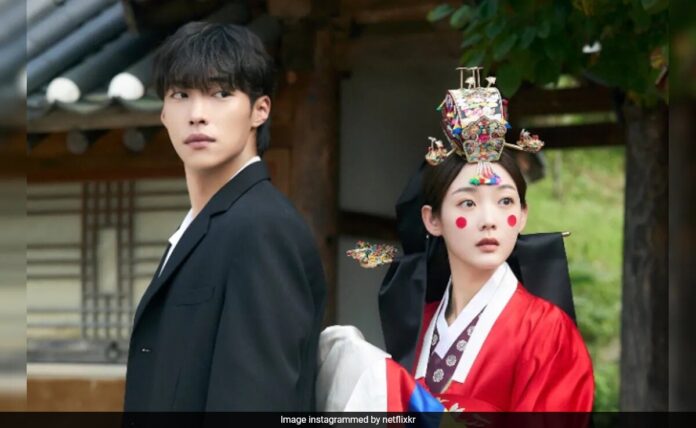New Delhi:
Mr. Plankton, a limited K-drama series on Netflix, is a deeply emotional and sometimes perplexing exploration of human connection, loneliness and the search for meaning in life’s final chapters. With its blend of dark comedy, slapstick humour and poignant drama, the show offers a unique, albeit uneven, viewing experience that oscillates between moments of warmth and emotional coldness. At its heart, Mr. Plankton follows the lives of two central characters, Hae Jo (Woo Do-hwan) and Jo Jae-mi (Lee Yoo-mi), whose fates collide in a series of unpredictable events. Hae Jo, a jaded and cynical man, is reeling from the news of his terminal illness. With only months to live, he embarks on a reckless road trip to find his biological father, a journey he inadvertently shares with Jae-mi, an ex-lover on the cusp of an arranged marriage to a wealthy, conservative family. The twist? Jae-mi, too, is grappling with devastating news – she’s infertile, shattering her dreams of motherhood. Together, they navigate a winding path full of emotional revelations, miscommunications and increasingly absurd situations.
The drama, penned by Jo Yong (also known for It’s Okay to Not Be Okay), presents an intricate balance of humour and pathos. On the one hand, it plays with familiar K-drama tropes: the misunderstood, brooding male lead, the emotionally wounded female lead and a string of quirky side characters who offer lightness amid the heaviness. On the other hand, Mr. Plankton often subverts expectations, throwing its characters into bizarre scenarios that can feel jarring or even disorienting. Some of these moments, like Hae Jo’s impulsive kidnapping of Jae-mi on the day of her wedding, set the tone for the series – a darkly comedic yet deeply tragic exploration of people struggling with their identities and desires in the face of impending loss.
While the show promises an emotionally charged romance between Hae Jo and Jae-mi, their relationship lacks the spark one might expect. Despite their shared history, the chemistry between the two leads is somewhat forced, with Woo Do-hwan’s aloofness and Lee Yoo-mi’s occasional indecisiveness leaving their dynamic feeling flat. Hae Jo’s unpredictable nature, while meant to be a source of intrigue, often comes across as more erratic than charismatic and his emotional journey feels underdeveloped compared to the emotional payoff the show seeks to deliver.
In contrast, the supporting characters are arguably the show’s strongest elements. Kim Min-seok’s Kka Ri, the ever-optimistic and often comedic sidekick, provides much-needed levity to the otherwise heavy storyline. Meanwhile, Oh Jung-se’s portrayal of Eo Heung, Jae-mi’s fiance, is perhaps one of the most nuanced performances in the series. As the well-intentioned but naïve heir to a conservative family, Heung is a sympathetic character whose quiet desperation and slow unravelling offer a heartbreaking counterpoint to the more flamboyant actions of Hae Jo.
The show also delves into the themes of family, abandonment and the search for belonging. Hae Jo’s fractured relationship with his family and his desperate need for connection are central to his motivations but the narrative doesn’t always do justice to the complexity of his character. Similarly, Jae-mi’s personal struggle with her infertility feels like an emotional core that is occasionally lost in the shuffle of the series’ broader themes. The series does attempt to comment on social issues, such as the pressure to conform to traditional family values, but it sometimes feels too bogged down by its sprawling and often unfocused, plotlines.
Visually, Mr. Plankton is a mixed bag. While the rural landscapes on the road trip provide some scenic beauty, the show’s aesthetic can feel a little too sterile and artificial at times, struggling to capture the rawness and intimacy that would make the emotional beats land more powerfully. This, coupled with a plot that occasionally drags, creates a viewing experience that is often more frustrating than fulfilling. At just 10 episodes, the series has the potential to be tighter, but the pacing suffers from unnecessary delays and moments of repetitiveness that only serve to dilute the stakes.
The show’s title, Mr. Plankton, is an apt metaphor for the central theme: the idea that even the smallest, most insignificant beings have value. It’s a sentiment that runs throughout the show, with its characters all grappling with their own feelings of worthlessness and longing for something more. However, this theme is never fully realised, and by the end of the series, many viewers might find themselves left with more questions than answers. The narrative arc feels incomplete, and while the series attempts to explore the complexities of human emotions, it ultimately leaves its characters -and the audience – without the catharsis they deserve.
The series’ final moments, while emotionally stirring, are telegraphed too early and the emotional payoff doesn’t feel as earned as it should. This is especially true for the finale, which leaves several loose threads hanging and offers a resolution that feels more like a sigh of relief than a satisfying conclusion. The characters’ growth is evident but it often feels rushed and the melodrama that the show leans on in its final episodes risks undercutting the emotional sincerity that Mr. Plankton aims to convey.
Ultimately, Mr. Plankton is a K-drama that will resonate with viewers who appreciate complex characters and are willing to navigate its more uneven moments. However, for those seeking a neatly packaged emotional journey, the show might fall short. Its blend of dark humour, romance, and tragedy is not always well-executed and while it offers a glimpse of emotional depth, it struggles to fully connect with its audience. For all its ambition, Mr. Plankton might leave some viewers questioning its message – or perhaps wondering what could have been if the series had embraced its darker, more introspective side instead of veering into a more convoluted, sometimes chaotic path.



